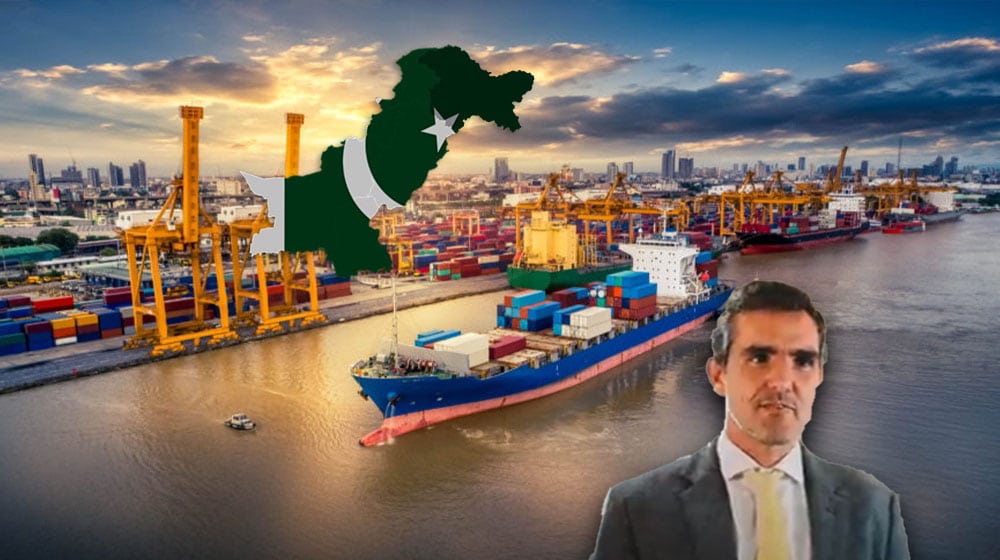Import bans are not the answer to balance of payments constraints, rather, they exacerbate the underlying problem, according to World Bank Senior Economist Gonzalo Verela.
A month ago I wrote this 🧵 on why #import duties were not the answer to #Pakistan's Balance of Payments constraints. #ImportBans are certainly not the answer either. Rather, they exacerbate the underlying problem. Five thoughts. 🧵👇https://t.co/TYvUz4EjMy
— Gonzalo Varela (@gonwei) May 20, 2022
Discussing the backdrop of Pakistan’s persistent and large trade deficit on Twitter, the trade and macroeconomic researcher supported his narrative by comparing macro indicators impacting the country’s current account balance and the possible repercussions of the government’s ban on a number of imported goods.
In a series of tweets, Varela explained, “CAD results from a macro imbalance (Saving too low relative to investment, so foreign saving needed (borrowing) (CAD is the mirror image of borrowing from the rest of the world (financial account of BOP)). Fixing the CAD takes increasing saving (cool off demand)”.
According to the WB economist, the import ban in Pakistan reduces imports, but not the CAD because it also reduces exports. He said, “The way this import ban in Pakistan is done in SRO 598-1/2022 for the main items banned (cars, mobiles) looks more like an incentive to domestic producers NOT TO EXPORT than an attempt to save forex. In fact, it gives them a generous monopoly power”.
Simply put, the new ban targets built cars, built mobiles, but not their parts. “Monopoly to the assembler, Pakistan consumer captive. The domestic company will increase demand for import of parts (that come cheap under 5th schedule even w/tariff exemptions) and sell w/supernormal profits,” he added.
Varela continued to explain that imports will not change much, “but the composition will (more imports of parts for mobiles, less of cbu mobiles). Tariff revenue will fall”. He highlighted that “the monopoly power given to domestic firms producing articles under the ban are such that it’ll be difficult to convince them to export! Difficult to find a large enough tax break that compares!”
In his final remarks, the researcher noted that the import ban gives no relief in the short run. It will be more problematic, would give long-run headaches in the form of distortions, offer less competition, and fewer tech transfers, which translates into less productivity. More policy uncertainty means fewer orders, and fewer investments, he concluded.


























This writer says that with the ban on import of CBU cars and Mobiles, there will be no technology transfer. What a research ? How much technology has been transferred so far by importing BMW Audi and Merceds for the last 40 years? Can the WB researcher respond?
The WB research is unprofessionally written as it did not incorporate the standard of living segment in it.
In a low income environment the Ban of Luxurious items will provide better results to host country, than in the rich country where affect of such ban neutralize the local production with parts needed.
On the other hand, parts are not required in abundance in poor country.
I get it as the inflation would rise, just have to see the cons.
Anyway
Yeah I get the reason behind it and it’s for good.
Imported solution including luxury goods rejected. If we don’t ask, why is he offering unsolicited advice? Banning unwanted stuff is the way forward. Start joint ventures under CPEC in SEZs to increase production and increase export of value added products and generate employment.
Disagree. Companies importing should invest in pakistan and install plants transfer technology so that employment will increase. Follow Indian model where they ask technology transfers rather imports.
Twisted logic, partisan to IMF & WB agenda.
I am unable to understand your points. Simply ban of luxury items will improve balance of payments.This may improve savings and investment as well as local employment as demand for local products increases.All arguments favour Pakistan economy. Rather WB Economist is afraid of situation if Pakistan gets rid of luxury items and in turn gets rid of foreign debts.
As the CBU are banned the duty on parts should be increased so the manufacturers do not take undue advantage and government is getting revenue on imports.
I disagree! These measures are necessary to reduce imports in the short run. In order to reduce raw material imports, economic growth will have to be REDUCED, interest rates will have to be raised much more (close to 20%) due to high inflation (which is a bad idea). The government needs to allow finished goods imports in the medium-long term, with higher high regulatory duties.